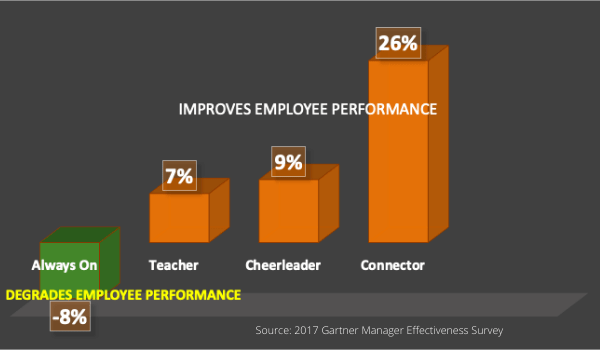Not all mentorships yield great results. The success of managers in training and enhancing the performance of their team members depends on the type of managers they are. Some are popular, yet ineffective; some are experts in their domains, but fail to train others; some prefer to encourage from outside the circle.
Depending on their ability to enhance employee performance, Gartner segregates managers into four groups –teachers, cheerleaders, connectors and always-on managers.

The under-performers
While they are overzealous and have the right intention, ‘always-on managers’ are not very successful. On the contrary, they seem to have a negative impact on the development of the team’s skills and expertise.
As the name suggests, such managers are always ready to help and are quite popular. In fact, they would go an extra mile to give employees in-the-moment coaching and feedback, even when they lack personal experience. They also provide frequent feedback and coaching, and drive employee development. However, the irony is that all their efforts are in vain. Instead of having a positive impact and driving employee performance, this set of managers degrades employee performance by eight per cent – according to a Gartner study — despite their popularity.
 Their overenthusiasm works in the negative. Always-on managers are so committed to guiding employees at every opportunity that it becomes hard for employees to focus on the areas that actually need real improvement. Besides, the always-on managers believe that some guidance is unequivocally better than no guidance, whereas the fact is that in today’s dynamic world, no one can have all the answers.
Their overenthusiasm works in the negative. Always-on managers are so committed to guiding employees at every opportunity that it becomes hard for employees to focus on the areas that actually need real improvement. Besides, the always-on managers believe that some guidance is unequivocally better than no guidance, whereas the fact is that in today’s dynamic world, no one can have all the answers.
The borderline
 Next in line are the ‘teacher managers’ who have some impact on employee development. These managers have graduated from being exceptional individual contributors. Their experience and expertise allow them to provide advice-oriented feedback and direct employee development. They have a positive impact on employee performance and tend to improve it by seven per cent.
Next in line are the ‘teacher managers’ who have some impact on employee development. These managers have graduated from being exceptional individual contributors. Their experience and expertise allow them to provide advice-oriented feedback and direct employee development. They have a positive impact on employee performance and tend to improve it by seven per cent.
 The ‘teacher managers’ are followed by the ‘cheerleader managers’. This type comprises managers who are like outside supporters. They will neither get into details nor say anything critical or negative while giving feedback. Instead, they will empower their team members or employees to take development into their own hands. Despite their restrained approach, these managers tend to improve employee performance by nine per cent, according to the Gartner study.
The ‘teacher managers’ are followed by the ‘cheerleader managers’. This type comprises managers who are like outside supporters. They will neither get into details nor say anything critical or negative while giving feedback. Instead, they will empower their team members or employees to take development into their own hands. Despite their restrained approach, these managers tend to improve employee performance by nine per cent, according to the Gartner study.
The clear winners
The ‘connector managers’ emerge as the clear winners, because they boost employees’ discretionary effort, engagement and intent to stay — all critical outcomes for enterprise performance. They have the ability to enhance employee performance by 26 per cent, and more than triple the likelihood of the team members turning out to be high performers.
 Instead of trying to coach on their own, connector managers spend more time evaluating the kind of coaching needed and then redirect the employees to the required set. They not only identify the needs, interests and aspirations of their teammates accurately, but also connect them to the right people and resources at the right time. All because they are active listeners!
Instead of trying to coach on their own, connector managers spend more time evaluating the kind of coaching needed and then redirect the employees to the required set. They not only identify the needs, interests and aspirations of their teammates accurately, but also connect them to the right people and resources at the right time. All because they are active listeners!
Connector managers also build an open and highly-motivating team environment that recognises and encourages peer-to-peer skill sharing. The team connection serves as a highly productive, self-contained ecosystem for learning. Let us take the example of a company that introduced a new practice of ‘Each one, teach one’. In this approach, the employees listed the expertise and skills they were willing to share with and teach to others. At the same time, they also listed the kind of training or upskilling each one wanted for themselves. The programme just linked the two requirements, and the connector manager’s role was to create a transparent environment around skill strengths and the importance of peer development. Connectors flex their coaching approach based on individual development needs and receptivity.
Unlike other managers, connectors create an environment where employees intentionally share skills and boost each other’s performance within team interactions. For the employees, connection is very important. The connectors’ foundational understanding of what drives and motivates each employee helps them tailor the broader team environment to match employees’ individual motivators, thus creating a productive and trusting space.



